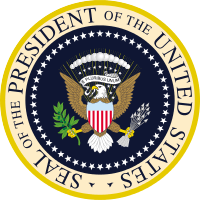Rosalynn Carter
| Rosalynn Carter | |
|---|---|
 Carter's White House Portrait (1977) | |
| First Lady of the United States | |
|
In role January 20, 1977 – January 20, 1981 | |
| President | Jimmy Carter |
| Preceded by | Betty Ford |
| Succeeded by | Nancy Reagan |
| First Lady of Georgia | |
|
In role January 12, 1971 – January 14, 1975 | |
| Governor | Jimmy Carter |
| Preceded by | Hattie Cox |
| Succeeded by | Mary Busbee |
| Personal details | |
| Born |
Eleanor Rosalynn Smith August 18, 1927 Plains, Georgia, U.S. |
| Political party | Democratic |
| Spouse(s) | Jimmy Carter (1946–present) |
| Children | |
| Alma mater | Georgia Southwestern State University |
| Religion | Baptist |
| Signature |
|
Eleanor Rosalynn Carter (née Smith; born August 18, 1927) is the wife of the 39th President of the United States, Jimmy Carter, and in that capacity served as the First Lady of the United States from 1977 to 1981. She has for decades been a leading advocate for numerous causes, perhaps most prominently for mental health research. She was politically active during her White House years, sitting in on Cabinet and policy meetings as well as serving as her husband's closest adviser. She also served as an envoy abroad, to Latin America in particular.
Early life
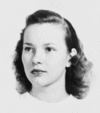
Eleanor Rosalynn Smith was born on August 18, 1927 in Plains, Georgia, the eldest of four children of Wilburn Edgar Smith (1896–1940), an automobile mechanic and farmer, and Allethea "Allie" Murray Smith (1905–2000), a dressmaker. Her brothers were William Jerrold "Jerry" Smith (May 5, 1929 – November 20, 2003), an engineer, and Murray Lee Smith (January 19, 1932 – January 26, 2003), a teacher and minister. Her sister, Lillian Allethea Wall, formerly Smith (born November 10, 1936), is a real estate broker.[1] Rosalynn was named after Rosa, her mother's mother.[2] Carter claimed that she and her siblings were unaware that they were in poverty, since even though their family "didn't have money," neither did "anyone else, so as far as we knew, we were well off."[3] At the center of her family's community were churches and schools, and the people of Plains had familiarity with each other.[4] Carter played with boys during her early childhood since no girls on her street were the same age as she. She believed that she would become an architect, since she drew buildings and was interested in airplanes.[5]
Rosalynn's father died of leukemia when she was 13. She called the loss of her father the conclusion of her childhood.[6] Thereafter, she helped her mother raise her younger siblings, as well as assisting in the dressmaking business in order to meet the family's financial obligations. At Plains High School, Rosalynn worked hard to achieve her father's dream of her going to college.[7] Rosalynn graduated as salutatorian of Plains High School. Soon after, she attended Georgia Southwestern College, but later dropped out.[8] Though having aspirations to go beyond Plains, she was forced to attend the college due to lack of money and her obligations to her mother and siblings.[9]
Marriage and family
Although their families were acquainted,[1] Rosalynn first dated Jimmy Carter in 1945 while he was serving at the United States Naval Academy at Annapolis. She developed a crush on him after seeing a picture of him in his Annapolis uniform.[10] As the two were riding in the back of Ruth Carter's boyfriend's car, Jimmy surprised Rosalynn by kissing her. Rosalynn had previously never allowed a boy to do this on the first date.[11] Rosalynn agreed to marry Jimmy in February 1946 when she went to Annapolis with his parents. The two scheduled their marriage to take place in July, and kept the arrangement secret. Rosalynn resented telling her mother she had chosen to marry instead of continuing her education.[12] On July 7, 1946, they married in Plains. The marriage canceled Rosalynn's plans to attend Georgia State College for Women, where she planned to study interior design.[13]
The couple had four children: John William "Jack" (born 1947), James Earl "Chip" III (born 1950), Donnel Jeffrey "Jeff" (born 1952), and Amy Lynn (born 1967). The first three were born in different parts of the country and away from Georgia, due to her husband's military duties. During those duties, Rosalynn watched over and enjoyed the independence she had gained from raising the children on her own. However, their relationship faced its first major crisis when she opposed Jimmy's resigning to return to Plains in 1953 after he learned his father was dying.[13] After purchasing their first television set, the two became fans of the New York Yankees.[14] They said they never went to bed arguing with each other.[15]
In 1953, after her husband left the Navy, Rosalynn helped run the family peanut farm and warehouse business, handling accounting responsibilities. Since 1962, the year her husband Jimmy was elected to the Georgia State Senate, she has been active in the political arena.
Rosalynn had different relationships with each member of Jimmy's family. Becoming friends with his sister Ruth Carter Stapleton, who was two years younger than her, she gave her dresses she had outgrown.[16] However, she and Jimmy's mother Lillian Gordy Carter had difficulty living together.[17]
In later years, the couple daily rode two and a half miles on three-wheel electric scooters, and read the Bible aloud to each other in Spanish before they retired to bed each night.[18]
First Lady of Georgia
After helping her husband win the governorship of Georgia in 1970, Rosalynn decided to focus her attention on the field of mental health as First Lady of Georgia. It was her main focus.[19] She was appointed to the Governor's Commission to Improve Services for the Mentally and Emotionally Handicapped. Many of the Commission's recommendations were approved and became law. She also served as a volunteer at the Georgia Regional Hospital in Atlanta, Georgia, and for four years was honorary chairperson for the Georgia Special Olympics.[20] Carter called her aid for the mentally disabled children her proudest achievement as First Lady of Georgia.[21] Among wives of the governors she was considered a model and was revered for her traits and appearance. Her activities included entertaining as many as 75 people a week at the Governor's Mansion.[22]
Campaigning
In January 1975, when the gubernatorial term ended, Rosalynn, Jimmy and Amy Carter returned to Plains. Jimmy had already announced plans to run for President of the United States. Rosalynn returned to the campaign trail, this time on a national quest to gather support for her husband. She campaigned alone on his behalf in 41 states. Due to her husband's obscurity at the time, often she had to answer the question, "Jimmy who?"[19]
During the months when she was campaigning across the country, she was elected to the board of directors of the National Association of Mental Health, honored by the National Organization for Women with an Award of Merit for her vigorous support for the Equal Rights Amendment, and received the Volunteer of the Year Award from the Southwestern Association of Volunteer Services.
Rosalynn sat in the balcony at Madison Square Garden with friends and family the night of the nomination while her husband was with his mother and daughter. She had "butterflies in her stomach," until the Ohio delegation announced its votes were for her husband. Rosalynn wished she could have been with him at that time.[23] The Carters met with all the potential running mates, and instantly gained affinity for Walter Mondale after meeting with him and his wife Joan.[24]
First Lady of the United States
Major initiatives

In January 1977, Rosalynn and Jimmy Carter walked hand-in-hand down Pennsylvania Avenue during his presidential inauguration parade. For the inaugural balls, she wore the same gown she had worn six years earlier at the balls in Atlanta when her husband became governor.[25]
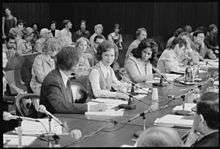
Rosalynn declared that she had no intention of being a traditional First Lady of the United States.[13] During her husband's administration, Rosalynn supported her husband's public policies as well as his social and personal life. In order to remain fully informed, she sat in on Cabinet meetings at the invitation of the President. The first meeting she attended was on February 28, 1977, where she felt comfortable since she was among other officials that were not members of the unit. The idea for her to be in attendance came from her husband's suggestion after she started to question him about a news story.[26]
She wrote notes, but never spoke. As she put it, "I was there to be informed so that when I traveled across the country, which I did a great deal, and was questioned by the press and other individuals about all areas of government, I'd know what was going on."[26] When the cultural exchange program Friendship Force International launched at the White House on March 1, 1977, she became honorary chairperson, a position she held until 2002. She joined Lady Bird Johnson and Betty Ford in supporting the unsuccessful campaign for the Equal Rights Amendment (ERA) at the Houston conference celebrating the International Women's Year in 1977.[27][28] Rosalynn Carter served as an active honorary chair of the President's Commission on Mental Health. On behalf of the Mental Health System Bill, enacted in 1980, she testified before a Senate committee, the second First Lady to appear before the Congress (the first being Eleanor Roosevelt). Of her priorities, mental health was the highest. Working to change the nature of government assistance to the mentally ill, Carter wanted to allow people to be comfortable admitting their disabilities without fear of being called crazy.[29]
For Christmas 1977, she decorated the White House's Christmas tree with ornaments from pine cones, peanuts and egg shells.[30] On July 27, 1978, Carter was the host of "First Lady's Employment Seminar". 200-300 delegates came and shared information to learn how other communities responded to unemployment.[27] Rosalynn remembered 1979 and 1980 as years of never-ending crises, the years having "Big ones and small ones, potential disasters and mere annoyances."[31] By the time she had held the office of First Lady for two years, Time magazine called her the "second most powerful person in the United States." Carter was cited by her husband as an equal partner many times, even called her a "perfect extension of myself."[32]

Despite finding time to entertain, the Carters never were able to match their immediate predecessors and Rosalynn never considered it a major part of her job as First Lady.[33] Criticism came towards her role as First Lady by a U.S. diplomat in Brazil, who insisted that women were meant to be kept "at home and that's all." The cultural factor had also caused many to oppose her trip.[29] Critics called her too programmed and disciplined while others said she lacked admirable qualities of Lady Bird Johnson and Betty Ford.[34] Despite this, Rosalynn was pleased by her viewed role as a demanding First Lady and remembered the times of presidents' wives being "confined" to "official hostess" and other demeaning roles.[35] In efforts to advance the appearance of the White House, she accumulated American paintings.[36] In the last few months of her husband's presidency, Rosalynn was confident that she and her husband would be able to defeat Ronald Reagan in the general election. On her birthday, she saw polls that showed they were gaining on Reagan, whose previous lead of 25 percent had decreased to 7.[37] Her husband's loss came shortly after the passing of the Mental Health System Act, which sought to do much of what she had wished for during her tenure. However, after Reagan was elected, she reflected "funding of our legislation was killed, by the philosophy of a new President. It was a bitter loss."[38] Despite the defeat, she was happy over the Iran hostages finally being able to come home the day of his inauguration.[39]
Travels
Rosalynn represented President Carter in meetings with domestic and foreign leaders, most notably as an envoy to Latin America in 1977. She purposely scheduled so as not to have meetings with any of the heads of state.[40] Rosalynn also led a delegation to Thailand in 1979 to address the problems of Cambodian and Laotian refugees. She examined camps where Cambodian refugees had fled to avoid the combat between the Vietnamese troops and the government of Pol Pot.[41] Helping the refugees, particularly the children, became a special cause for her. She returned to the United States and played a prominent role in speeding up a large appeal for assistance after being affected by the suffering she witnessed during her visit.[42] By the time she had returned, however, her husband met with families of the hostages in Iran. They were more concerned for what they needed to do to get them out over being worried about whether or not they would ever get out.[43]
Life in the White House
She was the first First Lady to keep her own office in the East Wing.[44] She also oversaw her family at the White House. Her daughter, Amy, attracted much public attention. The two youngest sons, Chip and Jeff, and their families also lived in the White House. Other members of the family, including son Jack and his wife and children, were frequent visitors. Rosalynn Carter's Secret Service codename was "Dancer".[45]
The Carter Center
After leaving the White House in 1981, Rosalynn, like her husband, continued to lead a very active life. In 1982, she co-founded The Carter Center, a private, not-for-profit institution based in Atlanta, Georgia. The Carters built their home after returning to Georgia.[33] She is a member of the Center's Board of Trustees and participates in many of the Center's programs, but gives special attention to the Mental Health Program.[46] Carter and her husband fell into serious debt immediately after leaving the White House, but were able to alleviate this by writing projects and were able to open the Carter Center from their revenue. She, like Betty Ford before her, would say the American people made a mistake in not reelecting her husband and was bitter over the election.[47] At this time she expressed resentment of Ronald Reagan, and even told interviewer Mike Wallace that he was ruining the country. Rumors at this time spread that she was running for Governor of Georgia, which she denied and outright stated she had no political ambition.[48] When asked nearly two decades later why she had not run for Georgia Senate after Hillary Clinton was pondering to run, she responded "What would I have done in Washington, with Jimmy in Georgia?"[49]
Rosalynn and her husband's first major project with the Carter Center was to help in peace between Israel and its neighbors. The two visited the Middle East in March 1983 and worked with Kenneth W. Stein and other associates of the Carter administration, and invited top leaders from a wide range of cities and countries to participate. This included the Palestinian community, Jordan, Syria and Egypt.[50] In the early summer of 1986, she and her husband aided the poor by helping to build homes on the North and West sides of Chicago.[51] The two were accompanied by members of the Habitat for Humanity as they wielded hammers and saws[52] while working for a week to construct homes in a vacant lot.[53] The Carters removed themselves and the Carter Center in 1991, from direct involvement in the Middle East at the time that President George H. W. Bush and Secretary of State James Baker became more active. However, they did monitor the Oslo peace agreement of 1993, which sprung from the President and Secretary of State's bringing Palestinians and other parties involved in the matter at a conference in Madrid.[54]
Mental health advocacy
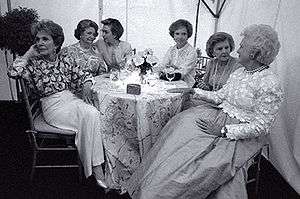
Rosalynn Carter created and serves as the chair of The Carter Center Mental Health Task Force, an advisory board of experts, consumers, and advocates promoting positive change in the mental health field. She hosts the annual Rosalynn Carter Symposium on Mental Health Policy, bringing together nationwide leaders in the mental health field.
In April 1984, she became an Honorary Fellow of the American Psychiatric Association and serves as a board member emeritus of the National Mental Health Association. In 1985, she started the Rosalynn Carter Symposium on Mental Health Policy. The launch and its proceeds allowed representatives of mental health organizations to come together and collaborate on prominent issues.[55] Success of the Symposium led the creation of the Mental Health Program in 1991. Carter established the Mental Health Task Force that same year to guide the Symposia as well as other Mental Health programs.[56] Rosalynn became chair of the International Women Leaders for Mental Health in 1992.[57] Three years later, she was honored with the naming of the Rosalynn Carter Mental Georgia Health Forum.[58]
The Rosalynn Carter Fellowships for Mental Health Journalism provide stipends to journalists to report on topics related to mental health or mental illnesses. The one-year fellowship seeks to promote public awareness of mental health issues, as well as to erase the stigma associated with them.[59]
In 2007, Rosalynn Carter joined with David Wellstone, son of the late U.S. Senator Paul Wellstone, in pushing Congress to pass legislation regarding mental health insurance.[60] She and Wellstone worked to pass the "Paul Wellstone and Pete Domenici Mental Health Parity and Addiction Equity Act of 2008" which requires equal coverage of mental and physical illnesses when policies include both types of coverage. And both testified before a House subcommittee regarding the bill in July 2007.[60]
Legislation requiring parity in health insurance coverage for treatment of mental illnesses was ultimately passed and signed into law in October 2008.[61]
Rosalynn Carter Institute for Caregiving
Rosalynn Carter is president of the board of directors for the Rosalynn Carter Institute for Caregiving (RCI) at Georgia Southwestern State University, her alma mater in Americus, Georgia. The RCI, which was established in 1987, aims to address issues related to caregiving in America and internationally. The institute focuses its work on both family and professional caregivers for individuals living with chronic illness and disabilities, limitations related to aging, and other health concerns across the lifespan. It plays a major role in moving science into practice for caregivers by supporting the implementation of evidence-based programs and interventions for caregivers in community settings.[62]
Advocacy for women and children
In 1988, Rosalynn Carter convened with three other former first ladies—Betty Ford, Lady Bird Johnson, and Pat Nixon—at the "Women and the Constitution" conference at The Carter Center to assess that document's impact on women. The conference featured over 150 speakers and 1,500 attendees from all 50 states and 10 foreign countries. The conference was meant to promote awareness on sexual inequality in other countries, and fight against it in America.[63]
She served on the Policy Advisory Board of The Atlanta Project (TAP) of The Carter Center, addressing social ills associated with poverty and quality of life citywide.
In 1991, she launched Every Child By Two, a nationwide campaign that sought to increase early childhood immunizations along with Betty Bumpers, wife of former U.S. Senator Dale Bumpers of Arkansas. Rosalynn Carter serves as President of the organization and Bumpers pas Vice President. The campaign's launch was in response to the deaths of nearly 150 people after a resurgence of measles.[64]
She also serves on the board of advisors for Habitat for Humanity and as an honorary chair of Project Interconnections, both of which aim to provide housing for those in need. Additionally, she is a deacon at her and her husband's Plains Baptist church.[65]
Current activities
Rosalynn and her husband joined other First Ladies and Presidents in attending the funeral of Gerald Ford[66] and six months later, attended Lady Bird Johnson's as well.[67]
In 2010, she criticised television crime dramas that portrayed mentally ill people as violent, when in fact they were more prone to being victims of crime.[68] On May 7, 2010, she attended the Michelle Obama-hosted Mother's Day Tea at the White House, and was joined by her granddaughter Sara and infant great-granddaughter.[69] On October 12, 2011, the Carters breakfasted at Poste Moderne Brasserie in Washington, D.C., while the two were in town for the twentieth anniversary of Every Child by Two.[70] After the death of Betty Ford on July 8, 2011, Carter delivered a eulogy during a memorial service.[71] Carter called her one who had the courage to speak the truth and fight stigmas surrounding illness and addiction, even calling her "a tireless advocate for those struggling."[72]
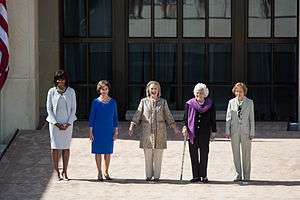
Carter attended a speech given by Georgia National Guard's Colonel Brent Bracewell in the morning hours of October 25, 2012.[73] Carter gave out the Georgia Paraprofessional Caregiver of the Year, Volunteer Caregiver of the Year, Family Caregiver of the Year, and an award with her namesake, the Rosalynn Carter Leadership in Caregiving Award later that day and expressed happiness in the amount of progress that had been made "since we started."[74]
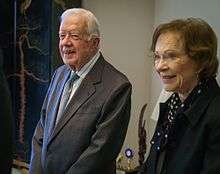
On April 25, 2013, Carter attended the dedication of the George W. Bush Presidential Library and Museum with her husband and other former First Ladies and Presidents. In October 2013, Carter spoke about her confidence in the American people and her lack of confidence in the government on the issue of the income gap in the United States.[75] Carter had "one of the greatest disappointments" corrected when learning from Health and Human Services Secretary Kathleen Sebelius that the Obama administration had passed a mental health insurance rule.[76] She was "shaking" after learning about the government rules that required equal treatment for mental health upon hearing the announcement in November 2013.[77] She and her husband were saddened by the death of Nelson Mandela.[78]
In August 2015, her husband announced his cancer diagnosis, stating that it had spread throughout his body.[79] Betty Pope, cousin of the former president, at the time of the announcement voiced her belief that Carter would remain committed to her husband and attested to her strength.[18] Carter made her first public comments about the illness a month later in September, saying, "In spite of what's going on, it's been kind of wonderful just to know we have that kind of support, and also Jimmy's attitude is helping".[80] In November 2015, she and her husband traveled to Memphis, Tennessee where they assisted in construction for the town's Habitat for Humanity affiliate.[81][82]
In January 2016, Jimmy Carter confirmed that he was regularly having treatments and said of Rosalynn at the time, "Her support has helped me through the last 69 years since we’ve been married in everything I’ve ever tried. Of course, when I was ill and thought I might die at any time, she was there for me."[83][84]
Books
Rosalynn Carter has written five books:
- First Lady from Plains (autobiography), 1984, ISBN 1-55728-355-9
- Everything to Gain: Making the Most of the Rest of Your Life (with Jimmy Carter), 1987, ISBN 1-55728-388-5
- Helping Yourself Help Others: A Book for Caregivers (with Susan K. Golant), 1994, ISBN 0-8129-2591-2
- Helping Someone with Mental Illness: A Compassionate Guide for Family, Friends, and Caregivers (with Susan K. Golant), 1998, ISBN 0-8129-2898-9
- Within Our Reach: Ending the Mental Health Crisis (with Susan K. Golant and Kathryn E. Cade), 2010, ISBN 978-1-59486-881-8
Awards and honors
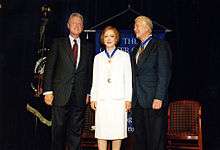
On October 5, 2002, Rosalynn Carter was inducted into the National Women's Hall of Fame in Seneca Falls, New York. She became only the third First Lady ever inducted into the Hall of Fame, joining Abigail Adams and Eleanor Roosevelt. (Hillary Clinton was inducted in 2005.)
In 1999, Rosalynn and Jimmy Carter received the Presidential Medal of Freedom, the nation's highest civilian honor.
Among Rosalynn's many other awards for service are:
- Dorothea Dix Award, Mental Illness Foundation, 1988
- Georgia Woman of the Year Award, 1996
- Jefferson Award for Greatest Public Service Benefiting the Disadvantaged, 1996[85]
- United Nations Children's Fund International Child Survival Award, 1999
- Rhoda and Bernard Sarnat International Prize in Mental Health, Institute of Medicine, 2000
- United States Surgeon General's Medallion, 2000
- American Peace Award along with Jimmy Carter,[86][87] 2009
Rosalynn Carter has received honorary degrees from the following institutions:
- H.H.D., Tift College, 1979
- L.H.D., Morehouse College, 1980
- D.P.S., Wesleyan College, 1986
- LL.D., University of Notre Dame, 1987
- D.Litt., Emory University, 1991
- L.H.D., Georgia Southwestern State University, 2001
- LL.D., Regis College, 2002
- Queen's University, 2012
Rosalynn served as distinguished centennial lecturer at Agnes Scott College in Decatur, Georgia, from 1988 to 1992. She has been a Distinguished Fellow at the Emory University Department of Women's Studies in Atlanta since 1990.
In popular culture
- The Mars Volta referenced Carter's mental health advocacy in their song "Tetragrammaton".
Footnotes
- 1 2 "Rosalynn Carter". nndb.com. Retrieved 2008-04-13.
- ↑ Carter, Rosalynn (1984), p. 3.
- ↑ Carter, Rosalynn (1984), p. 12.
- ↑ Carter, Rosalynn (May 6, 2010). "Rosalynn Carter: Solving the Mental Crisis for Our Children". Huffington Post.
- ↑ "Where I'm From". Atlanta. February 1, 2012.
- ↑ Carter, Rosalynn (1984), p. 17.
- ↑ Godbold, p. 44.
- ↑ https://www.geni.com/people/Rosalynn-Carter/6000000007539296639
- ↑ Wertheimer, p. 343.
- ↑ O'Brien, p. 253.
- ↑ Ryan, p. 21.
- ↑ Godbold, pp. 58-59.
- 1 2 3 Kaufman, p. 119.
- ↑ Carter, Rosalynn (1984), p. 27.
- ↑ Hambleton, Laura (May 6, 2013). "Jimmy Carter, now 88, on aging and health".
- ↑ Carter, Rosalynn (1984), p. 4.
- ↑ Godbold, p. 84.
- 1 2 "Jimmy Carter's Cancer Fight: Wife Rosalynn Is 'Scared' But 'Right There with Him," Friends and Family Say". August 15, 2015.
- 1 2 Lindsay, p. 229.
- ↑ Rosalynn Carter, First Lady from Plains, Houghton Mifflin Co., Boston, 1984: pp. 74–111
- ↑ PsychiatryLectures (September 25, 2011). "Rosalynn Carter on mental health policy 1982". Youtube.com.
- ↑ Godbold, p. 217.
- ↑ Gherman, p. 63.
- ↑ Carter, Jimmy (2010), p. 89.
- ↑ Rosalynn Carter, First Lady from Plains, Houghton Mifflin Co., Boston, 1984: p. 6, 148
- 1 2 Carter, Rosalynn (1984), p. 185.
- 1 2 Gould, p. 389.
- ↑ Rosalynn Carter, First Lady from Plains, Houghton Mifflin Co., Boston, 1984: pp. 143–300
- 1 2 Gould, p. 387.
- ↑ Meeks, Scott (December 25, 2013). "History of White House Christmas trees". ABC 7.
- ↑ Marton, p. 239.
- ↑ Wertheimer, p. 145.
- 1 2 Lindsay, p. 230.
- ↑ Caroli, p. 275.
- ↑ Caroli, p. 277.
- ↑ Watson, p. 57.
- ↑ Carter, Rosalynn (1984), p. 359.
- ↑ Caroli, p. 273.
- ↑ Gould, p. 390.
- ↑ Carter, Rosalynn (1984), p. 184.
- ↑ Kaufman, p. 122.
- ↑ Ronayne, p. 77.
- ↑ Carter, Rosalynn (1984), p. 334.
- ↑ "Little-known facts about our First Ladies". Firstladies.org. Retrieved 2015-07-07.
- ↑ Walsh, Kenneth T. (2003). "Appendix". Air Force One: A History of the Presidents and Their Planes. Hyperion. pp. 227. ISBN 1-4013-0004-9.
- ↑ Rosalynn Carter Biography, The Carter Center, http://www.cartercenter.org/news/experts/rosalynn_carter.html
- ↑ O'Brien, p. 256.
- ↑ Conversation with Carter. October 1998.
- ↑ Marton, p. 243.
- ↑ Carter, Jimmy (2008), p. 15.
- ↑ "Carters to help build homes here". Chicago Sun Times. January 13, 1986.
- ↑ Brown, Mark (January 14, 1986). "Carters to build homes for poor here". Chicago Sun Times.
- ↑ Weintraub, Larry (July 12, 1986). "A `lot more' to do, builder Carter says". Chicago Sun Times.
- ↑ Carter, Jimmy (2008), p. 17.
- ↑ Levin, p. xix.
- ↑ Coleman, p. 52.
- ↑ "Biography of Rosalynn Carter". Retrieved 27 July 2016.
- ↑ Schneider, p. 318.
- ↑ Columbia Journalism Review, Nov./Dec. 2007
- 1 2 "Former first lady joins fight for mental health coverage". Associated Press. 2007-07-11. Retrieved 2007-07-17.
- ↑ "Bailout marks last push for mental health bill". 2 October 2008.
- ↑ Rosalynn Carter Institute for Caregiving. Rci.gsw.edu. Retrieved on 2012-04-26.
- ↑ Carter, Jimmy (2008), p. 233.
- ↑ Szabo, Liz (November 14, 2011). "Former first lady Rosalynn Carter champions vaccines". USA Today.
- ↑ Jimmy Carter Interviewed by Albert Mohler – Institute on Religion and Democracy – Institute on Religion & Democracy. IRD (2012-03-27). Retrieved on 2012-04-26.
- ↑ Swarns, Rachel L. (January 3, 2007). "Ford's Funeral Draws Array of Politicians and Dignitaries". The New York Times.
- ↑ Shannon, Kelley (July 15, 2009). "Lady Bird Johnson laid to rest in Texas". The Denver Post. Associated Press. Retrieved January 1, 2014.
- ↑ "Rosalynn Carter pens new book on mental health". FOX31Online. May 3, 2010.
- ↑ Calmes, Jackie (May 8, 2010). "Mother's Day at the White House". The New York Times.
- ↑ "Hey, isn't that. . . ?: Jimmy and Rosalynn Carter". October 12, 2011.
- ↑ Slosson, Mary (July 11, 2011). "Michelle Obama to attend Ford service in California". Reuters.
- ↑ Slosson, Mary (July 12, 2011). "Betty Ford remembered at California memorial service". Reuters.
- ↑ Gallagher, Colby (October 25, 2012). "Rosalynn Carter attends care giving presentation". FOX31Online.
- ↑ "Rosalynn Carter Institute honors caregivers". FOX31Online. November 1, 2012.
- ↑ "Carter: Middle class today resembles past's poor". USA Today. October 8, 2013.
- ↑ DelReal, Jose (December 6, 2013). "Rosalynn Carter: W.H. fixes mental health gap". Politico.
- ↑ Camia, Catalina (December 9, 2013). "Rosalynn Carter: Being first lady a 'great soap box'". USA Today.
- ↑ "Statement from former President Jimmy Carter on Nelson Mandela's death". Atlanta Journal Constitution. December 5, 2013.
- ↑ Pramuk, Jacob (August 12, 2015). "Former President Jimmy Carter reveals he has cancer". New York: CNBC. Retrieved August 12, 2015.
- ↑ "Rosalynn Carter gets emotional over Jimmy's cancer diagnosis". WSB-TV. September 16, 2015.
- ↑ "President Carter visits Memphis for Habitat for Humanity, promises to return next year". Memphis Business Journal. November 2, 2015.
- ↑ "Jimmy, Rosalynn Carter Coming to Memphis for Habitat for Humanity Build". Memphis Daily News. October 31, 2015.
- ↑ Hensch, Mark (January 25, 2016). "Carter on cancer fight: 'I'm still taking treatments regularly'". The Hill.
- ↑ Seemayer, Zach (January 24, 2016). "EXCLUSIVE: Former President Jimmy Carter Says He's Not Cancer-Free: 'I'm Still Taking Treatments'". Entertainment Tonight.
- ↑ "Jefferson Awards FoundationNational - Jefferson Awards Foundation". Jeffersonawards.org. Retrieved 2016-09-07.
- ↑ The American Peace Award. The American Peace Award. Retrieved on 2012-04-26.
- ↑ "Carter, former first lady to get peace award". FOX31Online. August 21, 2009.
- Portions of this article are based on public domain text from ibiblio.
References
- Carter, Rosalynn (1994). First Lady from Plains. University of Arkansas Press. ISBN 978-1557283559.
- Lindsay, Rae (2001). The Presidents' First Ladies. Gilmour House. ISBN 978-0965375337.
- O'Brien, Cormac (2005). Secret Lives of the First Ladies: What Your Teachers Never Told You About the Women of the White House. Quirk Books. ISBN 978-1594740145.
- Marton, Kati (2002). Hidden Power: Presidential Marriages That Shaped Our History. Anchor. ISBN 978-0385721882.
- Ronayne, Peter (2001). Never Again?: The United States and the Prevention and Punishment of Genocide since the Holocaust. Rowman & Littlefield Publishers. ISBN 978-0742509221.
- Ryan, Bernard (2006). Jimmy Carter: U.S. President and Humanitarian. Ferguson Pub. ISBN 978-0816059034.
- Coleman, Earl Clark (2004). Welcome Back, Carter: 2004 Democratic Presidential Poll Winner. 1st Book Library. ISBN 978-1414032009.
- Watson, Robert P. (2005). Laura Bush: The Report to the First Lady: 2005. Nova Science Publishers. ISBN 978-1594542909.
- Gherman, Beverly (2003). Jimmy Carter. Lerner Pub Group. ISBN 978-0822508168.
- Carter, Jimmy (2008). Beyond the White House: Waging Peace, Fighting Disease, Building Hope. Simon & Schuster. ISBN 978-1416558811.
- Godbold, E. Stanley (2010). Jimmy and Rosalynn Carter: The Georgia Years, 1924–1974. Oxford University Press.
- Levin, Bruce Lubotsky (2010). A Public Health Perspective of Women's Mental Health. Springer. ISBN 978-1441915252.
- Carter, Jimmy (2010). White House Diary. Farrar, Straus and Giroux. ISBN 0374280991.
External links
- The Carter Center
- National First Ladies Library
- New Georgia Encyclopedia
- Rosalynn Carter Institute for Caregiving
- Appearances on C-SPAN
| Honorary titles | ||
|---|---|---|
| Preceded by Hattie Cox |
First Lady of Georgia 1971–1975 |
Succeeded by Mary Busbee |
| Preceded by Betty Ford |
First Lady of the United States 1977–1981 |
Succeeded by Nancy Reagan |
| United States order of precedence (ceremonial) | ||
| Preceded by Jimmy Carter as Former President |
Order of Precedence in the United States | Succeeded by George H. W. Bush as Former President |

